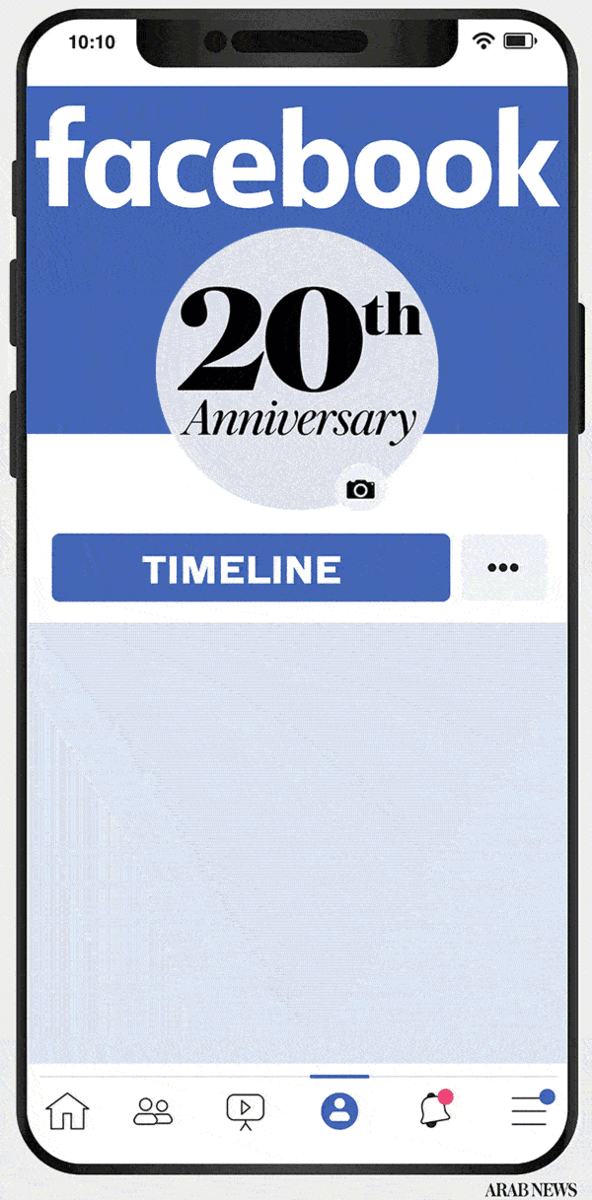DUBAI: “My parents like photography and when the digital age came, they shifted from photobooks to Facebook,” 23-year-old Dubai resident Alexandra Morata told Arab News.
Morata, like many her age and younger, grew up to find out that their parents had been posting pictures of them — including of their awkward teenage years — on Facebook.
The phenomenon was so common that there is a term for it: sharenting.
A paper written by child development experts defines sharenting as “the practice of parents, caregivers or relatives sharing information about their children (underage) online, typically on some online platforms.”
A massive 80 percent of children had an online presence before they were 2 years old, according to a 2010 study by online security firm AVG.
The presence of baby pictures on the news feed was seemingly so pervasive that in 2013 a browser extension called UnBaby.me was created to auto-detect baby images and replace them with others, including of cats.
As Facebook turns 20, the babies who once pervaded its news feed barely use the platform now.

Teenagers spent nearly two hours on TikTok every day, compared to just one minute on Facebook and 16 minutes on Instagram, according to a 2022 study.
Morata and Aily Prasetyo, 24, both said they have shifted to other platforms like Instagram and TikTok partly due to their friends not being on Facebook anymore, and also because “Facebook was so populated with … old people,” said Prasetyo.
“Facebook is a platform for millennials and baby boomers while TikTok is more for a younger audience and is known for its emphasis on authentic videos rather than ones that are overly sales oriented,” Nimrah Khan, founder of digital marketing agency Kollab Digital, told Arab News.
Those considered Generation Z are overwhelmingly embracing TikTok. It was the top platform of choice for Gen Zs overtaking YouTube, Instagram and Snapchat, according to a study last year by research firm YPulse.
Globally, seven of the top 10 countries for TikTok, by reach, are in the Middle East North Africa region, according to “Social Media in the Middle East 2022: A Year in Review” published by the University of Oregon-UNESCO Crossings Institute.
TikTok even overtook online giant Google in 2021 as the most popular website of the year, according to internet security company Cloudflare.
Khan has a warning though: “TikTok’s algorithmic recommendations can expose users, including teenagers, to inappropriate content or potential privacy risks based on their browsing history and interactions on the platform.”
Still, many youngsters remain open to sharing their lives online because they, in large part, understand the security risks of living a digital life.
Morata, for example, said that she does not have any privacy concerns around the pictures her parents shared of her childhood because they had private profiles. The conversations around online safety have made her more aware of the risks, and so, she is careful with her accounts, she added.
Social media “can be detrimental to mental health,” but it has become such a common topic of conversation that most older teens are aware of what is fake and what is not, especially as influencers have started becoming more authentic, said Prasetyo.
Despite that awareness, social media platforms can have dangerous effects on youngsters’ mental health.
Cam Barrett, who is now in her early twenties had her personal life — from bath photos to the fact that she was adopted — shared publicly on Facebook by her mother. It is a habit she inculcated too, sharing much of her life publicly, when she opened a Twitter account, she told The Atlantic.
But last year, Barrett was among the people who advocated for children’s internet privacy.
“Today is the first time that I’ve introduced myself with my legal name in three years because I’m terrified to share my name because the digital footprint I had no control over ... exists,” she said testifying in front of the Washington State House last year.
The testimony was to support a bill that aims to ensure that children who are heavily featured in influencers’ online content have a right to financial compensation for their work and to maintain their privacy.
“I know firsthand what it’s like to not have a choice in the digital footprint you didn’t create that follows you around for the rest of your life with no option for it to be removed,” Barrett said.
The bill is the brainchild of Chris McCarty, a student at the University of Washington, who was inspired by the 2020 case of Huxley Stauffer, a toddler with special needs adopted from China by family vloggers Myka and James Stauffer.
The couple made and monetized extensive content about Huxley and his adoption, before giving him up because they realized they were not equipped to take care of him.
In 2021, whistleblower and former product manager at Facebook, Frances Haugen, leaked thousands of internal documents detailing how the company knew its apps helped spread divisive content and harmed the mental health of some young users.
Top bosses from all major social media companies have been called on for answers by lawmakers around the world.
On Wednesday this week, CEOs from Meta, TikTok, and other companies were grilled by US lawmakers over the dangers that children and teens face using social media platforms.
“They’re responsible for many of the dangers our children face online,” said US Senate Majority Whip Dick Durbin, and chair of the committee, during his opening remarks.
He added: “Their design choices, their failures to adequately invest in trust and safety, their constant pursuit of engagement and profit over basic safety have all put our kids and grandkids at risk.”
The hearing marked TikTok CEO Shou Zi Chew’s second appearance before the US Congress, since March 2023, when he was questioned about the growing influence of TikTok on young people’s mental health, among other concerns.



























